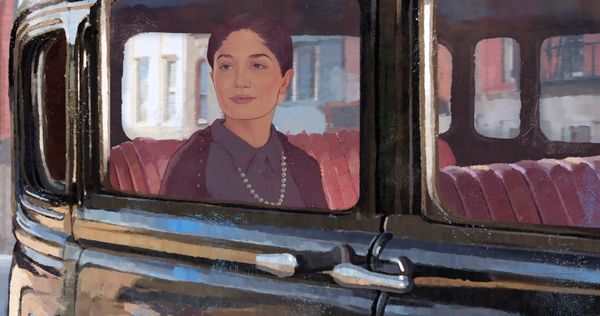Eye For Film >> Movies >> Aurora's Sunrise (2022) Film Review
Aurora's Sunrise
Reviewed by: Amber Wilkinson

Sometimes a film can strike you because it brings an untold story to life - and, in this, Aurora's Sunrise is doubly surprising in that this remarkable tale of survival from the Armenian Genocide was previously passed through the Hollywood machine to great fanfare but then subsequently forgotten.
Aurora Mardiganian was only 14 when she saw most of her family slaughtered. That is just the beginning of a story involving capture, slavery and escape that would, eventually, lead to a new life in the United States. There her story was turned into 1919 film Auction Of Souls - a film in which, incredibly, she played herself. Despite raising vital funds for survivors at the time, the film was thought lost until 18 minutes of it resurfaced in the Nineties. Director Inna Sahakyan blends this surviving footage with first person interviews with Aurora in old age and animation - Armenia's first feature in the medium and their submission this year for the International Feature Oscar - to recreate her story.

The bulk of the film is the animation, which is on the straightforward side compared to many films of this ilk, including the likes of Another Day Of Life and Waltz With Bashir, although the use of rotoscoping adds an element of realism. Animation has the potential to move away from retelling into psychological spaces but beyond a repeated motif concerning a play Aurora used to act out with her family, Sahakyan mostly sticks to re-enactment as Arpi Petrossian, as Aurora, recounts the story in the first-person. On an emotional level, it's the score from Christine Aufderhaar, featuring additional Armenian music from Andranik Berberyan and Garegin Arakelyan, that does a lot of the heavy lifting, its elegiac strings setting a sombre tone and moments of discordance taking us in to Aurora's headspace.
There are also moments when the silent film is cut in, largely acting as a reminder of how this sort of story was treated by Hollywood back then, but it is Aurora herself who, unsurprisingly, provides the most poignant observations as she looks back at her life. Her courage in the face of everything she went through is present not just in her testimony of the genocide and her subsequent taking on of authority in the US but in her desire for justice rather than revenge. The story also strikes an additional universal note of reprimand, when you consider that Hollywood also treated Aurora less as a person and more as a commodity to be used to its own ends. While there is no doubt that Aurora wanted her story out in the world, in hindsight it seems incredible that so many people seemed willing to add to her trauma in order to achieve this. Sahakyan, by comparison, ensures that Aurora herself has the last word.
Reviewed on: 08 Nov 2022
















